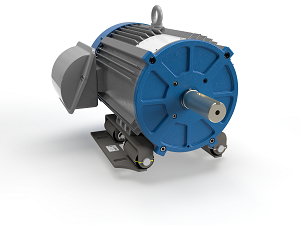
By Asmaa Lapouge, Cloud Product Marketing Manager, Ansys
With increased global competition and rising customer expectations, industrial engineers are under incredible pressure to lower their expenses while maintaining quality and performance. To overcome these challenges, they are transforming their workflows by bringing the physical and digital worlds together. Engineering simulation technology is at the forefront of the fourth industrial revolution, transforming data into actionable insight. Operational efficiency, reliability, durability, and performance of industrial equipment can all be improved and accelerated by simulation and cloud computing.
As part of this digital transformation, industrial engineers’ workflows often call for large models and intensive, multiphysics simulations. These analyses can take days or weeks to run on-premises even with moderate-sized models because they need to be analyzed at many time points. Running simulations on these models requires enormous compute resources. To avoid production bottlenecks and speed time to market, more and more customers are adopting a cloud-based simulation approach.
This way of engineering mixes simulation and cloud technologies to accelerate the design and testing process, enabling engineers to iterate more quickly and efficiently. This can help bring their products to market faster, stay ahead of the competition, and respond quickly to changing customer demand, but also mitigate risks. Doing more simulations helps industrial engineers innovate faster. It also enables them to avoid costly manufacturing issues by catching and correcting them early in the digital engineering process.
Running industrial simulations in the cloud offers several benefits that can enhance the efficiency and productivity of industrial operations. Firstly, it allows engineers to scale their simulations easily, without worrying about the limitations of their local computing resources. This means that they can run complex simulations involving large datasets and multiple variables without worrying about system crashes or other performance issues. As a result, engineers can get more accurate and insightful results from their simulations, which can help them optimize their industrial processes.
Secondly, cloud-based simulations offer greater collaboration opportunities for teams working on industrial projects. With cloud-based simulations, team members can access simulation data from anywhere in the world, as long as they have an internet connection. This means that they can work with experts and stakeholders from different locations and integrate their expertise into their simulations. By doing so, industrial engineers can ensure that their simulations are more accurate and representative of their manufacturing operations.
Finally, running simulations in the cloud can help optimize manufacturing costs. Cloud computing enables industrial engineers to use shared computing resources. They only pay for the hardware resources they use, mitigate the risk of failure, and they can easily scale up or down as needed. In addition, cloud-based simulations can help identify areas where industrial engineers can optimize their manufacturing processes and reduce waste, which can translate into significant cost savings over time.
An Innovative R&D Approach to Mix Cloud Technologies and Physics-based Simulation
 Electronics motor development is one example of an industrial sector application that benefits from simulation and cloud computing. It considers multiple domains such as electromagnetics, thermal, and structural — each with inherent challenges in a disruptive design environment. The presence of many nonlinear interactions and the changing physics involved make it difficult to estimate behavior in various areas involving changing design parameters. Overcoming these dynamics requires continuous iteration both at the domain level and across domains. The biggest challenge for Turntide Technologies, which develops and manufactures intelligent, sustainable motor systems, was computing all these interactions and quickly scanning through a large number of design variables to arrive at an optimal solution.
Electronics motor development is one example of an industrial sector application that benefits from simulation and cloud computing. It considers multiple domains such as electromagnetics, thermal, and structural — each with inherent challenges in a disruptive design environment. The presence of many nonlinear interactions and the changing physics involved make it difficult to estimate behavior in various areas involving changing design parameters. Overcoming these dynamics requires continuous iteration both at the domain level and across domains. The biggest challenge for Turntide Technologies, which develops and manufactures intelligent, sustainable motor systems, was computing all these interactions and quickly scanning through a large number of design variables to arrive at an optimal solution.
Turntide Technologies looked to Ansys Maxwell simulation software to optimize electromagnetics in its Smart Motor System designs via cloud bursting on several independent workstations. This was accomplished using Ansys Gateway powered by AWS to run a virtual cluster coupled with Maxwell’s electronics solvers to realize greater efficiency in electromagnetic optimization. It also helped Turntide establish a more flexible, collaborative workflow that enabled its engineers to run more design points faster in a high-performance computing environment while removing previously existing hardware barriers.
“Ansys Gateway powered by AWS unleashes the computing resources we need to quickly solve electromagnetics-related challenges in our Smart Motor System™ designs,” said Avisekh Banerjee, Ph.D. Director of Simulation and Analysis, Turntide Technologies. “We get tremendous acceleration during development with the added computational power, going from weeks to days to come up with answers to our most pressing technological challenges which otherwise would not have been possible.”
Thanks to the higher computation capabilities available on AWS, Turntide can analyze its designs 7X faster than on-premises and simultaneously run 125,000 simulations on Maxwell 2D software on the AWS cloud, reducing development cycles from months to weeks
Previously using 32 cores on-premises, it took more than four weeks on a workstation to optimize Smart Motor System™ designs. Now, with Ansys Gateway powered by AWS, users can easily create clusters with 4x the number of the cores and complete the simulation in less than four days.
For Turntide, Maxwell 2D enabled by Ansys Gateway powered by AWS is key to quickly understanding the electromagnetics and related physics that lead to the optimization of its Smart Motor System™ designs.
To learn more about Ansys Gateway powered by AWS, contact us now.





